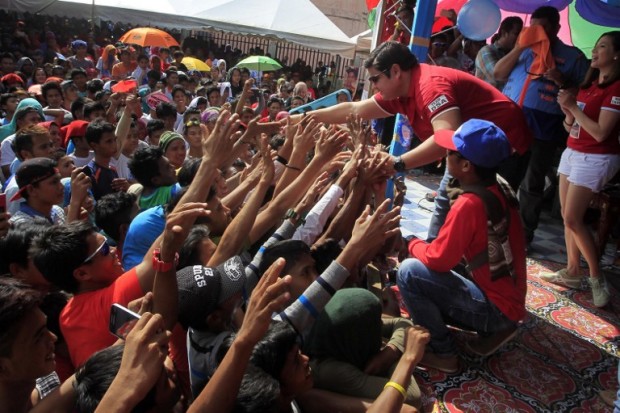Jail no barrier to political career in Philippines

This photo taken on April 28, 2016 shows Shariff Aguak’s mayoral candidate Sajid Ampatuan greeting supporters during a rally in Shariff Aguak town, Maguindanao province, in the southern Philippine island of Mindanao. His father, former provincial governor Andal Ampatuan, allegedly ordered his sons and their armed followers to kill 58 people in November 2009 in an attempt to stop a rival’s election challenge. / AFP PHOTO / MARK NAVALES
Walking off stage after a rock star-like performance and rapturous crowd reaction, Sajid Ampatuan oozes confidence that he will be elected mayor of a southern Philippine town despite facing charges of mass murder.
Ampatuan is among a bewildering array of politicians accused or convicted of major crimes who are running for office in Monday’s national elections, deepening concerns over a “culture of impunity” in the Philippines where powerful figures are often above the law.
Among the others are two ex-presidents–one convicted of plunder and the other on trial for alleged vote fraud and graft. One of the most infamous cases in previous elections was a convicted pedophile who twice ran for a seat in congress from behind bars and won.
Ampatuan, like the others, insists he is innocent.
“My conscience is clean,” Ampatuan, 33, told AFP after the campaign rally in his impoverished hometown of Shariff Aguak, during which he sang on stage alongside a minor television celebrity as hundreds of voters screamed and sang their support.
Article continues after this advertisementHis father, former provincial governor Andal Ampatuan, allegedly ordered his sons and their armed followers, to kill 58 people in November 2009 in an attempt to stop a rival’s election challenge.
Article continues after this advertisementSajid Ampatuan was among 28 members of the extended clan charged with murder over the “Maguindanao Massacre,” regarded as the worst outbreak of political violence in the Philippines in which 32 journalists were among the victims.
Sajid spent more than five years in a Manila jail while on trial, along with his relatives and about 100 others who were also charged.
But he was allowed to post bail last year after the judge ruled the evidence against him was weak.
“I’m a victim too,” Ampatuan said, referring to his time behind bars.
“The court itself released me. That means I had no involvement.”
Ampatuan is now running for mayor of Shariff Aguak, one of the towns in Maguindanao province where his family remains the most powerful political force.
The Ampatuan family is one of many Muslim clans that rule areas of the southern Philippines, often using their own private armies to enforce authority.
Ampatuan insists his family is still loved in the area, despite its leaders being charged with mass murder.
“I grew up here, the people know me. They know my family and what we did to help them. My grandfather, my father, my brothers. Ever since the 1950s, they (the voters) have been helped by the Ampatuans,” he told AFP.
Powerful family networks
One common theme among the candidates running this year while facing charges is that they come from rich and powerful political families, which can manipulate deeply corrupt political and judicial systems.
One of the most prominent politicians is Gloria Arroyo, who is enduring a long trial for corruption and vote fraud that was allegedly committed when she was president from 2001 to 2010.
Arroyo, who is suffering from a spinal illness, has been detained in a government hospital since she was arrested in 2011.
She initially won a seat in congress representing her family’s provincial stronghold immediately upon standing down as president, and was re-elected in 2013 despite the charges against her.
She will win a third consecutive term next week as she is running unopposed.
Meanwhile, siblings Joel and Mario Reyes are running for mayor and vice-mayor respectively of the resort town of Coron even though they are in jail for allegedly masterminding the murder of a prominent environmentalist in 2011.
Another controversial figure is Rey Uy, facing charges for running a vigilante death squad that allegedly killed over 80 people as mayor of the small southern city of Tagum. He is campaigning to win back his seat.
Absurd system
Under the law, a person must be “convicted with finality” to be disqualified from running. Hence, even someone convicted of a crime can still run as long as he or she has an appeal pending with the courts.
Political analyst Ramon Casiple described the system as “an absurdity” that allows the rich and powerful to evade justice.
He said politicians facing criminal charges use high-priced lawyers to delay legal proceedings. Then, while the process is stalled, they get elected.
“(Afterwards) they can use that public office as a springboard to pressure the court,” said Casiple, executive director of the Institute for Political and Electoral Reform.
One example was Romeo Jalosjos, a political kingpin from the southern Philippines, who was convicted in 1997 of raping an 11-year-old girl and sentenced to life in jail.
He was a congressman when convicted and still ran successfully for re-election from behind bars in 1998 and 2001. In 2007, Arroyo controversially reduced his sentence and he walked free two years later.
An even more prominent criminal still enjoying a successful political career is ex-president Joseph Estrada, who was convicted in 2007 of plunder during his time in power and sentenced to life in jail.
But Arroyo quickly pardoned him, and he was elected mayor of Manila in 2013. Estrada is running for a second term and is regarded as a near certainty to win on Monday.